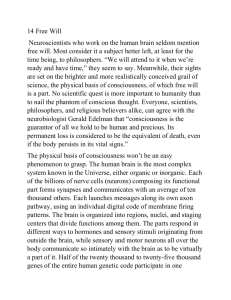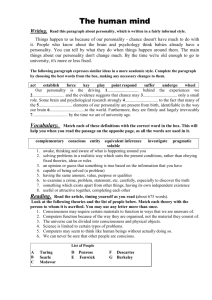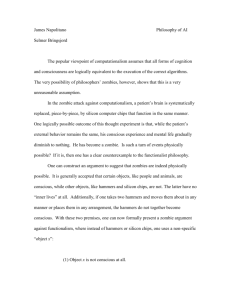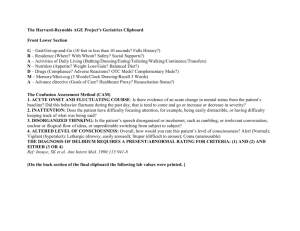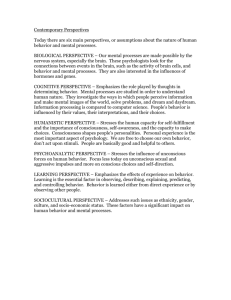Demystifying the Consciousness Quotient
advertisement
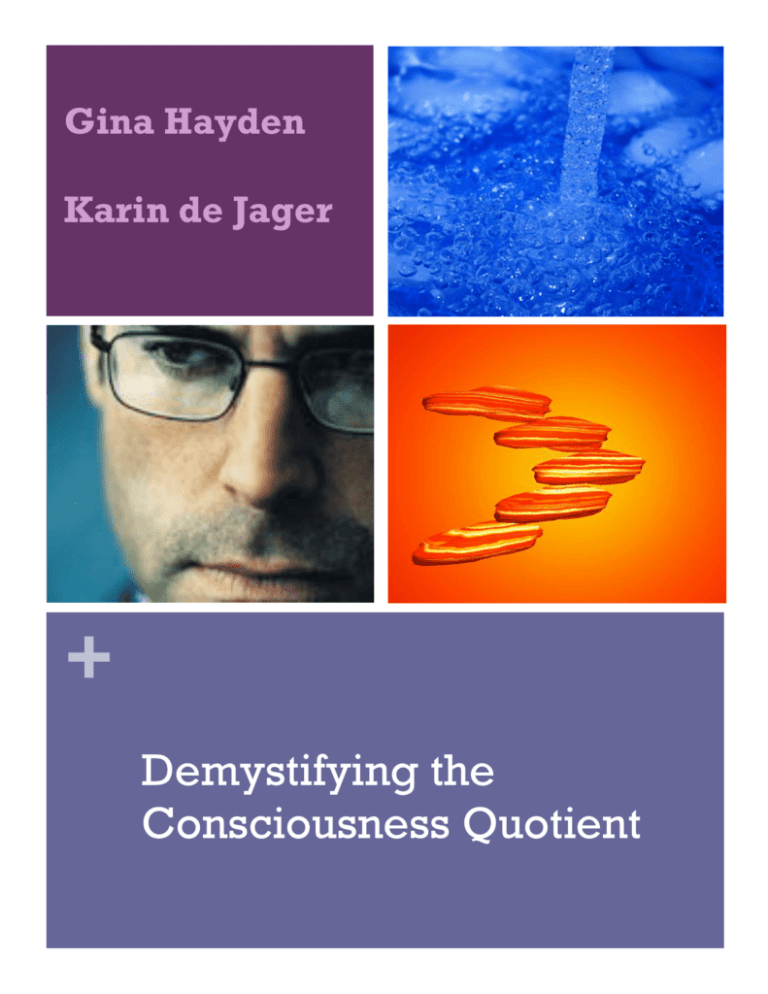
Gina Hayden Karin de Jager + Demystifying the Consciousness Quotient + C onsciousness is gathering a tidal Because this wave is recent and still wave of momentum across the forming, understanding exactly what we world. It is spoken of as “the new mean by CQ, and consciousness in currency”1, 2 and one of the ‘megatrends’ general, is still unchartered territory. The 3 of 2010 . To be involved in the field of word ‘consciousness’ retains an air of consciousness right now is to be at the mystery and inexplicability and there is a leading edge of a shift in thinking that is lot to be done to translate what we mean sweeping across the globe, including by consciousness, and its benefits, into laypersons and the business world alike. real world terms, never mind making it As recently as June 2009, Ovidiu Brazdau, a Romanian psychologist, coined the term ‘Consciousness Quotient’4 and we have since seen an abundance of websites, research and conferences catching this wave of momentum. 2 applicable and acceptable to a business world driven by hard fact. This article aims to begin to do just that. + What do we mean by consciousness and CQ? Human beings have a unique ability to be We would like to make the notion of conscious of their consciousness. A consciousness and CQ more dynamic simple way of viewing consciousness is: than simply defining it as a gently that of which we are aware. However, undulating state. To do so, let’s get back consciousness is not just self-awareness. to the idea of awareness. In our working It also includes a vast field of possibility - definition of a high CQ we would see it as that which we are not aware we are not being not just the ability to access greater aware of. The more conscious we amounts of information simultaneously, become, the greater access we have to but also as having a high level of this limitless field of potential to use and awareness create with in our daily lives, whether this colonised greater parts of the field of be for individuals or for organisations. possibility and therefore being more Brazdau’s CQ measures the amount of access we information have from simultaneously this vast field to of - in other words having aware of the things that you didn’t know that you didn’t know. What does this greater awareness give possibility. Someone with a high CQ can you? access information conscious gives you the capacity for simultaneously, whereas someone with a deliberate choice over the things of which lower CQ can access less information. you are aware. This might be your belief Hence, someone with a higher CQ will system, your automatic programmes that usually have a broader perspective, as often upload and sabotage your efforts, or long as this information is processed and it might be your skill in ‘operating understood. And this forms the link to IQ: consciousness’ which has its own set of IQ relates to the speed of a person’s tools ability to process information. CQ is the consciousness (or a higher CQ) enables ability to access more of this information, us to be in creation of the kind of life we which then leads to being more conscious want, rather than being in reaction to our generally, especially when this state of limited field of information. So, greater consciousness awareness equals great choice - or, in plenty is of maintained over a Greater choice. and techniques5. period of time. (Brazdau pitches your CQ Brazdau’s terms, greater mark at your level of consciousness 1/2 - information. 1 hour after waking up after a refreshing awareness = no choice. And, Being more Greater access conversely, to no sleep without being exposed to any stimulus such as coffee, TV etc). 3 + The importance of CQ for business In today’s unpredictable and turbulent business paradigm world, 21st century businesses need to operate on integrates a much more humanistic approach with a ethical and sustainable business practices6. completely predecessors. different level from their Recent events leading up to the global economic recession point fingers to the way we do business and preventing a repetition of these patterns in the future is critically important. Conjointly, businesses are more competitive, less differentiated and have employees who have changing expectations, wanting to be more personally connected with their work and their organisation’s values and vision. Together, these factors highlight the need for business leaders who are not only able to operate skillfully in a squeezed, competitive space, but who are able to adopt a profoundly different approach to the way they do business and lead their employees. This turns conventional economic models on their head. 4 What is required is a new business which embraces complexity and Businesses and business leaders can develop a sustainable competitive (and cooperative) business advantage by incorporating a thorough understanding and management of human consciousness7 - in other words, having leaders who possess a higher CQ. Superior leadership in this new generation of leaders will include those who are able to access multiple sources of information simultaneously, and who also have greater awareness, who know how to access and operate in a more conscious way, who can lead their businesses to consider the triple bottom line - people, planet and profit - and, of course, who incorporate a genuine human concern in the way they lead. + Further exploration of conscious business and In our opinion, if we are to develop the credibility conscious in of CQ in the world at large, it is important to stay subsequent papers, but for the moment we are true to what we understand to be the nature of concerned to present our view of what a higher consciousness (an understanding that is in its CQ may mean in terms of actual behaviour, be this infancy and is growing all the time) and to for the layperson or the business leader. describe leadership will be presented It seems that the current trend when looking at the relevance of CQ in business leaders is to focus on accurately what more conscious behaviour would look like, in leaders and in the population in general. the information accessing advantages of Brazdau There is similarly an implication that leaders with and the information processing advantages of IQ. higher CQ have the “uncanny ability to transcend Therefore, the benefits of a higher CQ for the the behavioural capabilities of their peers 12 business leader are deemed to be the ability to repeatedly” . However, what these behavioural use instinct and intuitive behaviour to make quick capabilities and accurate decisions, often with imperfect described, and this leaves one guessing as to how information sets8. a more consciously developed leader would Presumably, this honours Brazdau’s definition that someone with a higher CQ would have access to a wider range of information which would help him or her with the intuitive decision-making process. It is true that strengths in these areas come at the right time as levels of change in the 21st century speed up at an exponential rate and predictability and forecasting become based on assumption rather than on past information9. Einstein’s quote springs are that are displayed is not behave. What we are certain of is that it is not a call for leaders to act on their “base instincts”13. To do so would mean a leader who acts in reaction to his or her base instincts, and a leader who is in reaction rather than coming from a place of deliberate and conscious choice is, in our view, not a more conscious leader. to mind in this regard: “We can’t solve problems by using the same kind of thinking we used when we created them.” However, a higher CQ has also been linked, rather loosely in our opinion, to a range of leadership qualities accurately reflect developed which the don’t qualities consciousness. necessarily of a These more loose connections have been stated as being “more creative”, “more productive”, “more 10 appropriate”, “more accurate” , as well as “insight, intuition, instinct, creativity “We can’t solve problems by using the same kind of thinking we used when we created them.” Einstein and 11 confidence” . 5 + Conscious leadership behaviours So what then are the qualities of a more conscious to ‘transcend the behavioural capabilities of their peers’ leader? easier to pinpoint. Yes, it does entail the ability to access information more Building on Brazdau’s thinking, here is our view of the quickly and broadly than someone with a less-developed domains in which a leader with a higher CQ would CQ. However, if we follow Brazdau’s view, this operate. We have attempted to classify the conscious information can be drawn from the physical, emotional, behaviours according to Brazdau’s realms: Physical mental, spiritual, social/relational and self-conscious/self (PH); Emotional (EM); Mental (ME); Spiritual (SP); awareness realms, making the conscious leader’s ability Social/Relationship (SR); and Self-conscious/Self- awareness (SA). Self-awareness Clarity of future focus and purpose Focus on materiality (more than on story) - of body - of streams of thought and Constructive interpersonal Heightened intuition relationships and communication Heightened energy A mindset of abundance Fewer energy drainers Interconnectedness emotion - of personal journey Being in creation (more than in reaction) Self-awareness - Awareness - Awareness of your body (or bodystate proprioception) e.g. noticing immediately a change in your body’s state through stress, an adrenalin surge etc; (PH) - Awareness of your stream of 6 of your personal your buttons are pushed by journey of self-development e.g. circumstances, but rather having the having insight into your ability to consciously choose personality and being conscious deliberate path of action. a This, of of your self and the way you are course, requires awareness of your evolving and developing. (SA) programmes, because without this awareness (greater consciousness) Creation (more than Reaction) Having activity (what might be termed exercise deliberate choice and live mental proprioception) e.g. being from creation, rather than reaction. aware the This requires not being run by your Dealing directly with the facts and commentating voice in your head; automatic and well-worn habits and actuality of any given situation, rather (ME) reactions (your ‘programmes’) when and observing heightened ability to (SA; ME) thoughts, emotions and mental of a you have no choice over the matter. Materiality (more than Story) than your interpretation of the facts. This requires being able to promises, which cause a drag or Interconnectedness differentiate between your mental drain on the amount of conscious assumptions, awareness available to the leader in commentary, interpretations justifications the here-and-now. Reducing these and about a situation (your story about it) energy drainers requires having and not taking this story as reality, dealt with and resolved the clutter of but rather dealing in what is actually your happening in that moment. past (emotional regrets, This unfinished business etc), thereby enables you to live in the present streamlining the drag effect. (SR, ME) moment, rather than the past or future, and look for what would be Clarity of future focus you are as a leader, what you stand for, your purpose, your legacy and Heightened intuition Realising instantly, the life you are living into or creating. without much Clarity here represents your need for thinking and analysis. This perceived purpose in life, meaning includes being open to new the context in which you make your experiences and being conscious life and business choices. (ME, SP) about new information at all levels and from all sources. Greater consciousness would mean the ability oneness of all things and that one set of actions affects all other things. This leads to the conscious leader taking greater responsibility for his or her actions. (SP) So, as we can see, CQ entails not only the next authentic action under the This requires having clarity on who circumstances. (ME) A deeply held awareness of the the intuition benefit qualities and of instinct, inspiration leaders, but a that much broader spectrum of advantages that would transcend the behaviour of their peers and evolve them into the leaders to manage a more complex and uncertain future. Constructive interpersonal relationships and communication to avoid filtering information through This is akin to EQ and relationship habitual lenses of perception about intelligence: being able to read what is and isn’t important and, others accurately and being quick to instead, see data afresh. (ME) the presence of high energy levels in leaders. Leaders with a higher CQ have increased energy automatically available to them, because they have less ‘drag’ in the form of regrets, other and respond direct communication. (SR) Many studies on leadership report or changes accordingly, as well as dealing in Heightened energy concerns, notice incomplete business (see next point). (PH) Fewer energy drainers These exist in the form of relationship discontentments, past regrets and A mindset of abundance A mindset of abundance rather than scarcity requires being less on your guard against adopting instead losing out a mindset and of abundant possibility which makes Classification of Brazdau’s 6 dimensions of consciousness: PH = Physical EM = Emotional being a creator of your life an easier ME = Mental position to uphold and the notion of SP = Spiritual creating SR = Social/Relationship your future an exciting venture on which to embark. (ME) SA = Self-consciousness/Selfawareness other ‘incompletions’ such as broken 7 + Developing your CQ Short of embarking on a monastic pilgrimage of consciousness development or attending the valuable programmes that are available the world over14 to raise your consciousness quotient, there are some actions that practise the above qualities and which can be used every day. If you bear in mind that the key to consciousness is awareness, because with greater awareness you have greater choice, then consciousness-raising efforts are geared to help you become aware of and step away from your automatic programmes and reactions which trap you into habitual ways of responding, enjoying greater freedom of action, choice and information as a result. For the leader, the potential advantages of this are obvious. Regular check ins. Checking in with your self (body, mind and emotions) several times a day - becoming present - presence being a term for describing being in the here-and-now, not carried away by your thoughts or emotions or lost in other mental activity. See Eckhart Tolle’s texts15 for excellent descriptions of presence. Meditation techniques teach this skill of becoming present to yourself and it’s interesting to note Tolle’s advice that several momentary check-ins per day can be just as effective as one long meditation session - which leaders may struggle to fit into their schedule. Mindfulness training for executives and 16 leaders is available . Seek feedback. This is, of course, always a reliable way of gaining self-insight and being aware of your developmental journey as a leader, which adds to your self-awareness. Feedback takes you usefully into the territory of that which you didn’t know that you didn’t know about yourself. Develop your powers of observation. Observing your reactions to situations from a mental ‘arms-length’ and acknowledging that these reactions are attempts to control a situation or to survive – psychologically speaking. Our identities (or our egos) are single-mindedly invested in their survival - which is why we hold on so dearly to our views, practise divideand-conquer tactics and like to make ourselves look better than others. We often do this entirely unconsciously. Being more conscious doesn’t imply that you give up your ability to take action or make choices, but rather that you do this through conscious choice instead of unconscious, automatic programming or reaction to your circumstances. Assumption alert. Being on your toes about the assumptions you make and making a point of delving deeper to check in with information at source. At a practical level, this could mean asking others about the thinking behind their views which led them to their conclusions. It could also be listening to your own gut feeling and observing the assumptions you make. 8 Pursue actuality. Discovering what lies hidden within our stories about events17. Making assumptions is one form of falling into story. It makes acting powerfully more difficult because we try to effect change based on our interpretations, judgements and denials connected to circumstances. Better to accept and work with the material facts of what is actually true in this moment, without resisting them, denying them or deluding ourselves about them. A good question to ask yourself from this place of the actuality of ‘what is’, is: “What can I acknowledge?” And from there: “What can I decide and act upon? And what can I let go of?”18. One may continue to be in denial about a situation (although this is unlikely once it is recognised), but at least this choice for denial is a more conscious form of action. Allow your emotions to breathe. Acknowledgement works equally well with our feelings as it does with the facts of a situation. One way of growing more conscious is to acknowledge and express (even if only to yourself) your denied and judged feelings (this is often called the shadow side of ourselves), and to give space to these feelings through verbal expression, experiencing yourself moving through your internal judgements and walls of fear and shame19. Like a good wine, allowing our emotions to breathe enables all the facets of ourselves to be available for expression and results in a richer and more well-rounded end result. Consider that denied aspects of ourselves take up space in our consciousness and continue to be part of us, while we use up the energy of consciousness to keep them hidden, from ourselves and from others. A leader who is aware of, and has faced up to and accepted, more aspects of him- or herself is a leader who is more available to lead, spending less time and energy in denial and hiding himself from others. Ultimately, these leaders are more accessible to their followers, because they appear to be more human. Decrease ‘drag’. One way of doing this is to carry out a broad scan of everything living within your awareness that feels incomplete, is nagging you or for which you feel guilty. And then take action to complete these items. Have the conversation you need to have to bring about closure of unresolved issues, take action on the items of unfinished business that are taking up space in your consciousness. The freed-up energy this provides can be put to better use in the act of creation as a leader. And make it a habit to abide by your word and keep to your promises, keeping the decks clear of more incompletions as you go to prevent losing more energy in the future20. Practise abundance. Choose to practise and experiment with an abundant mindset: that there is enough to go around, that giving is a better practice than taking, and that giving out rather than hoarding (money, information, accolades) tends to encourage circulation of the same, including back to you. Experiment - and see what happens. 9 View relationships as mirrors. To develop your relationship consciousness, practise viewing others as a mirror of yourself in such a way that what you see in them may be a reflection of you demonstrated in your interactions with them21. Oneness. It might sound trite to say that an appreciation of interconnectedness or ‘oneness’ develops from all of the above, but it is true. When the barriers (mental and emotional habits) that cause us to feel separate from and unaffected by others are decreased (through all of the above practices), we naturally experience a greater sense of connectedness with all things. As a leader, this implies connectedness with our colleagues, our team, our employees, our organization, our competitors, our industry, regional economy, country politics, world trends…. The greatest practice to develop a sense of oneness is meditation. + Summary In this paper we have explored how the the following qualities: spending much of new thinking that is developing around their time located in the present moment, the consciousness quotient and conscious rather than being transported away by leadership is at risk of being defined too their thoughts, feelings and other mental loosely and we have aimed to contribute activity; because of this, they have the to the understanding of what is meant by ability to operate from a stable core which these terms. keeps them at arm’s length from their thorough We believe that doing a job of consciousness the reactions and enables them to enjoy more actual creativity and freedom in their choices for demystifying quotient in the action; and a tendency to deal in actuality qualities of the conscious leader will help (‘what is’) rather than their interpretations to build a picture of the kind of leader we and assumptions about situations, which so urgently need for business in the 21st means they can act powerfully to effect century change because they are less constrained behaviour terms and development and will of this defining encourage new brand the of by their Furthermore, leadership. perceptions and conscious habits. leaders experience a significant sense of oneness We believe that, in addition to the often- and interconnectedness with the world mentioned heightened around them and as such are motivated to conscious act responsibly toward the triple bottom intuition benefits and of inspiration, leaders behave in ways that demonstrate 10 line of profit, people and planet. They enjoy more available energy to lead Our aspiration is that by refining and because they have less ‘drag’ due to building on our understanding of the carrying and consciousness quotient and conscious relationships around with them in their leadership we are contributing to the consciousness. In all, they have greater development of leaders who can create access to the field of possibility - to that the way into a positive and conscious which we are not aware we are not aware future. incomplete business of – and, with this, more creative and collectively responsible action becomes possible. References 1. Bays, B. and Billet, K. (2009). Consciousness: The New Currency. Journey: London 2. Barrick, G. (2010). Time To Mind Your IQs, EQs – and your CQs too. Sunday Times, [online] Available from: http://www.timeslive.co.za/business/careers/article395653.ece/Time-to-mind-your-IQs--EQs-...-and-your-CQstoo [accessed 1 September 2010]. 3. Aburdene, P. (2005). Megatrends 2010: The Rise of Conscious Capitalism. MHampton Roads Publishing. 4. Brazdau, O. (2009). What is CQ? Conscious Quotient Research Centre www.consciousness-quotient.com. Available from: http://www.consciousness-quotient.com/what-is-cq/ [accesses 27 August 2010]. 5. CCI (Creative Consciousness International) [online]. Available from www.consciousnesscoaching.co.za [accessed 27 August 2010]. 6. Carter, H. (2010). What Do We Mean by Conscious Leadership? White Paper. Centre for Conscious Leadership [online]. Available from: http://www.ccls.co.za/ [accessed 27 August 2010]. 7. Khumalo, B. (2009). Human consciousness – the 21st century key to competitive advantage. Leaders Unlimited [online]. Available from: http://www.leadersunlimited.co.za/news.html [accessed 20 August 2010]. 8. Khumalo, B. (2009). Higher level of consciousness needed for leadership. Leaders Unlimited [online]. Available from: http://www.leadersunlimited.co.za/news.html [accessed 20 August 2010]. 9. Khumalo, B. (2009). Higher level of consciousness needed for leadership. Leaders Unlimited [online]. Available from: http://www.leadersunlimited.co.za/news.html [accessed 20 August 2010]. 10. Khumalo, B. (2009). Higher level of consciousness needed for leadership. Leaders Unlimited [online]. Available from: http://www.leadersunlimited.co.za/news.html [accessed 20 August 2010]. 11. Barrick, G. (2010). Time To Mind Your IQs, EQs – and your CQs too. Sunday Times, [online] Available from: http://www.timeslive.co.za/business/careers/article395653.ece/Time-to-mind-your-IQs--EQs-...-and-your-CQstoo [accessed 1 September 2010]. 12. Terra Nova Strategic PR. (2009). Leaders Unlimited [online]. Available from: http://www.leadersunlimited.co.za/news.html [accessed 20 August 2010]. 13. Terra Nova Strategic PR. (2009). Leaders Unlimited [online]. Available from: http://www.leadersunlimited.co.za/news.html [accessed 20 August 2010]. 14. See, for example, http://www.consciousnesscoaching.co.za/ and http://www.enlightennext.org 15. Tolle, E. (2005). The Power of Now: A Guide to Spiritual Enlightenment. Hodder Mobius: London Tolle, E. (2005). A New Earth: Create a Better Life. Penguin: London 11 16. Chaskalson, M. (2010). [online]. Available from: http://www.mindfulness-works.com/michaelchaskalson.php http://www.michaelchaskalson.com/ 17. Adapted from Vywamus foundation. (2010). [online]. Available from: http://www.vywamusfoundation.com/ [accessed 20 August 2010]. 18. A technique practised by CCI (Creative Consciousness International). (2010). [online]. Available from: www.consciousnesscoaching.co.za [accessed 20 August 2010]. 19. Adapted from Vywamus foundation. (2010). [online]. Available from: http://www.vywamusfoundation.com/ [accessed 20 August 2010]. 20. With acknowledgement to CCI (Creative Consciousness International). (2010). [online]. Available from: www.consciousnesscoaching.co.za [accessed 20 August 2010]. 21. Adapted from Vywamus foundation. (2010). [online]. Available from: http://www.vywamusfoundation.com/ [accessed 20 August 2010]. About the Authors Gina Hayden is based in South Africa and London (UK), and divides her time between clients in Africa, the Middle East and Europe. For the past twenty years she has been helping companies across the world develop their people. She specialises in mending and building positive relationships in companies, increasing cohesion and alignment in teams and improving their dynamics, and aligning whole organisations around their culture, change, values and future direction. She designs and runs workshops on creating excellent client relationships and having powerful, productive business conversations that get results. She coaches senior leaders and executives in the art of leading more consciously. She is passionate about the notion of conscious leadership which she sees as imperative in finding a new way to lead organisations and change the way we do business and influence the world. She believes deeply in our ability as human beings to become more conscious and self-aware and to free ourselves from the habitual and often hidden patterns that keep us playing small. Gina’s professional qualifications include an MSc in Counselling Psychology, an additional diploma in psychotherapy, qualified use of psychometric tools and international accreditation with the ICF (International Coach Federation) as an accredited Consciousness Coach and Professional Certified Coach. Contact Gina at ginahayden@sphereconsulting.org Karin de Jager is an International Coach and holds the ICF/ACTP accredited qualifications of Professional Coach, Relationship Coach and Accredited Consciousness Coach ® which she earned through the coaching academy Creative Consciousness International (CCI). Karin is an Accredited Coach for the ICF (International Coaching Federation) and a member of COMENSA (Coaches and Mentors of South Africa). Karin combines industry experience as Operations Director for an Infrastructure company managing large-scale projects with experience in Pharmaceuticals and Recruitment. Throughout her career, she was inspired by and found the missing link between people and equipment or people and results, and was able to align people with their authentic selfexpression. With this perspective she creates a sense of belonging for her clients and ignites their career passions in a business environment driven by hard fact and the challenges of cross-cultural settings. She realised her interest in coaching early on, and took on roles in counselling and mentoring, until she found her true passion as a coach, specifically in consciousness coaching. She coaches executives and senior leaders to become more conscious leaders. Contact Karin at karin@theconsciousway.co.za !! 12


